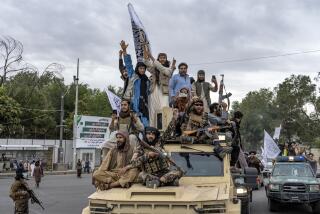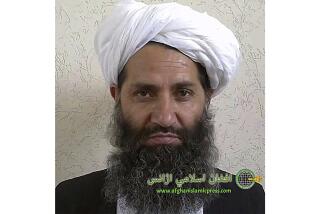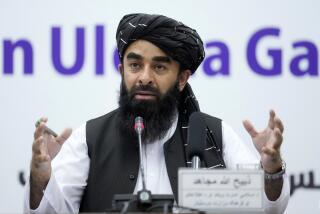Taliban Asks U.S. to Lift Its Economic Sanctions
WASHINGTON — A Taliban envoy appealed to the Bush administration Monday to overlook his group’s support of extremist Osama bin Laden and the destruction of priceless centuries-old Buddhist sculptures and lift sanctions on Afghanistan to help alleviate a humanitarian crisis threatening the lives of a million people.
Sayed Rahmatullah Hashemi delivered a letter from the Taliban for President Bush that called for better U.S.-Afghan relations and negotiations to solve the dispute over the Saudi-born Bin Laden.
“We ask all governments to talk to us and not harm us with sanctions,” Hashemi said afterward.
Referring to cruise missiles fired at Bin Laden’s alleged training camps in Afghanistan after the 1998 bombings of American embassies in Kenya and Tanzania, Hashemi added a plea for pragmatism.
“We ask the U.S. government to try to be pragmatic and to understand the facts in Afghanistan and to engage in talks with us if they have any problem with us, before they fire cruise missiles at us,” he said. “We hope this new administration will enhance the situation.”
At the same time, however, Hashemi warned that sanctions will not force the regime to change its policies.
“Trying to change our identity by U.N. sanctions will never work,” Hashemi said. Hashemi, a 24-year-old roving ambassador, was issued a visa because he is not a senior official, a category banned under new U.N. sanctions imposed in January.
In talks Monday with State Department and National Security Council staff, Hashemi said Afghanistan has complied with U.S. and U.N. requests to eradicate the fields that produce 75% of the world’s poppies used to make opium and heroin.
But the Taliban now needs aid and seeds to grow alternative crops, especially wheat and cotton. The Islamic government is particularly interested in gaining access to genetically modified seeds for stronger crops.
The war-ravaged country also needs aid to help deal with the worst drought to hit the region in three decades. But the Afghan envoy did not make a specific request for assistance, U.S. officials said.
Washington has cautiously welcomed Afghanistan’s anti-drug effort.
“If its claims are true, it’s very significant. But there are some other issues, such as stockpiles of previously produced heroin that need to be addressed. There are reports of large stockpiles,” said a U.S. official who met with Hashemi and asked not to be identified for diplomatic reasons.
The Taliban acknowledges that the stockpiles exist but claims that they are all in the small area of northern Afghanistan still controlled by its opponents.
Hashemi also claimed that the Taliban has tried to cooperate with the United States by complying with requests to isolate Bin Laden and cut him off from use of satellite phones and contacts with the media and other outsiders. The Afghan envoy charged that the United States is merely “trying to find a boogeyman.”
But the United States rejected the claims of compliance.
“We have not seen from the Taliban a proposal that would meet the requirements of the U.N. resolution to hand over Osama bin Laden to a country where he can be brought to justice,” State Department spokesman Richard Boucher said.
“The real question is what are the Taliban doing for the Afghan people whom they claim to govern, and it seems that they are doing very little beyond subjecting them to oppression,” he added.
At the same time, however, the United States is the largest donor of humanitarian goods to the Central Asian nation. Aid grew from $70 million in 1999 to $115 million last year. State Department sources said the amount of food aid channeled through the United Nations, Red Cross and nongovernmental groups is expected to increase this year.
Hashemi made his appeal as the Afghan government ordered the sacrifice of 100 cows to atone for the delay in destroying the two statues, which stood on the face of a cliff in Bamian. Taliban troops took more than two weeks to destroy the statues, using rockets, antiaircraft weapons and, finally, explosives.
More to Read
Sign up for Essential California
The most important California stories and recommendations in your inbox every morning.
You may occasionally receive promotional content from the Los Angeles Times.










